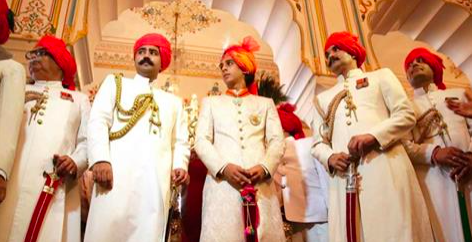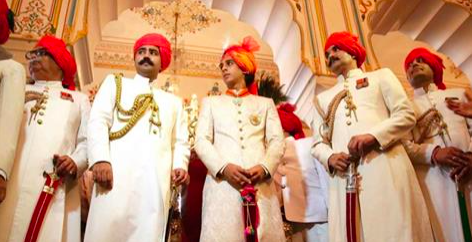
Even though the Indian constitution has nullified all royalties, it is still a tradition that has remained in parts of India. Recently, the royal family of Jaipur anointed their 18-year-old adopted son as the Maharaja of Jaipur. However, this didn’t go down too well with some people. A publication wrote about the Rajputs being “spineless” in Royals of Cuckoo Land!, and of Journalists.
On reading this, a Rajput herself Urvashi Singh took to social media to lash out at the ignorant article and absolutely nailed it!
She wrote:
My community is as royal as you make (or unmake) it. The bandwagon of royalty is frequently misunderstood by bashers like you. While defaming elitist press companies and journalists, I wonder how much flair you possess in your own writing, but wait, I have to remind myself that you’re too resentful to care.
Never mind.
First things first.
There is a history of the Rajputs far predating the British/Mughal invasions of India. A history that lays testament to eras whereby India had a responsible and accountable land-owning nobility. This nobility arose out of several backgrounds and had one characteristic in common- that they were victorious on the battlefield of life versus death; as well as in the political chessboard of power versus downfall.
The existing lineage of Rajputs is the fortunate half of what survived through several battles, conspiracies and deceits. Some survived them while others have been erased out of known existence. Regardless to say, this complex history of a community that worshipped unconditional courage and loyalty comprises of many Rajputs who relentlessly fought for and even died fighting for their people and country. Many are documented, while many are not.
You see, that’s the thing with history- ‘until the lion learns to write, every story will glorify the hunter.’
It doesn’t take much tact to understand who played the lion and who played the hunter as far as the British invasion of India was concerned.
Second.
My dear writer, you are seriously mistaken (or shall I say just point blank foolish) if you think all Rajput descendants sit with a silver spoon in their mouths while watching the heroic Tipu Sultan’s descendants pull rikshaws. Look around you. There is an exhaustive pool of Rajputs that still remains illiterate, unskilled, poverty-stricken/underpaid, unemployed and limited to what several experts would qualify as another ‘backward class’.
Speaking of the the more priveleged lot that you defame- have you remotely comprehended the extent to which Rajput privy purses have been seized and taken away by political figures, only to be stored in their Swiss bank accounts? Or, the sheer velocity at which our families have transformed themselves/ their lifestyles and choices to keep up with present-day demands of livelihood? The oft-unreported economic mass-migration of India’s Kshatriya community is a glaring reality nevertheless. Heritage hotel conversions, art/craft revivalisms and alternate job enrolments didn’t simply happen after an overnight epiphany. These are some stories of bread and butter that your mental faculty might have not grasped, and that’s too bad.
Welcome to the not-so-glorious history of the Rajputs, one which replaces glory with suffering and victory with loss. Rajput chieftains and noblemen didn’t possess assets as a means of extraction from the poor. Much to your dismay, the story is slightly different. They also conquered and consolidated lands and wealth that they were the custodians of, for the praja that most believed in serving, living and dying for. Not ruling in the way that your limited imagination makes you think.
Now don’t give me your story of the ethics behind being wealthy and powerful. Are you telling me that present-day business moghuls have been ethical in monopolising wealth through their entrepreneuring genius? Think again. But our contemporary sensibilities accredit their glory in ways similar to what the society acknowledged of Rajput legacies.
In times that recognise the power of negotiation and shrewdness more than that of valour and martial capabilities, many Rajputs were caught in a double-bind of mutual mistrust that was fed by and in turn, benefitted the British. The policy of annexation and the doctrine of lapse amongst other significant colonising masterstrokes by the British isolated several Rajput authorities into an inescapable corner whereby their discretion left them negotiating with a force that they would have otherwise unitedly reckoned with. Such is political strife, dear basher, and it got the better of the Rajputs and the kingdoms that they served (served more than ruled, and that is the bitter truth).
Third.
Much to your daftness, present-day Rajput functions and ceremonies are performed as a gesture and in a sentiment to commemorate the legacies of our ancestries. The ancestries that foresake themselves much before their times, so that we, their progeny could survive. The ancestries whose extended eras lead to a whole range of possibilities of what could have been. But we believe in moving on. And unlike you, we have.
We also celebrate more than just surviving. We celebrate living a dignified life, and unapologetically so.
Rajput customs have been lauded world over for their unique aesthetics and unadulterated finesse, an oft-imitated virtue that the Rajputs have never resented in return.
So much for being spineless, huh?
Lastly, the one thing that my community has ingrained in it is a power of resilience. Resilience to loss, theft, pettydom and resentment. Your resentment is not new. The unparalleled legacy of a community that has worshipped swords, ties of blood and died for its soil is loved by many and hated by others, but seldom ignored.
Thank you for finding its smaller shenanigans worthy of a tactless post in unflattering vocabulary, you are just another partial reflection of everything that is wrong with our society today. You definitely need some shaking up.
Smell your coffee.
I wish you a very good, or should I say, ‘royal’ morning!

